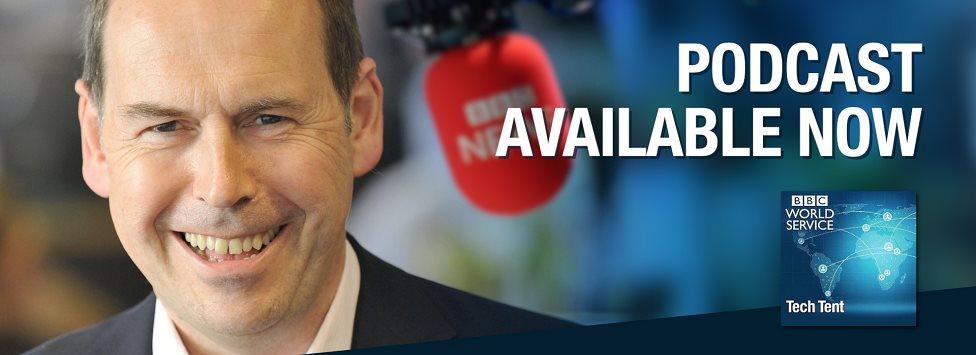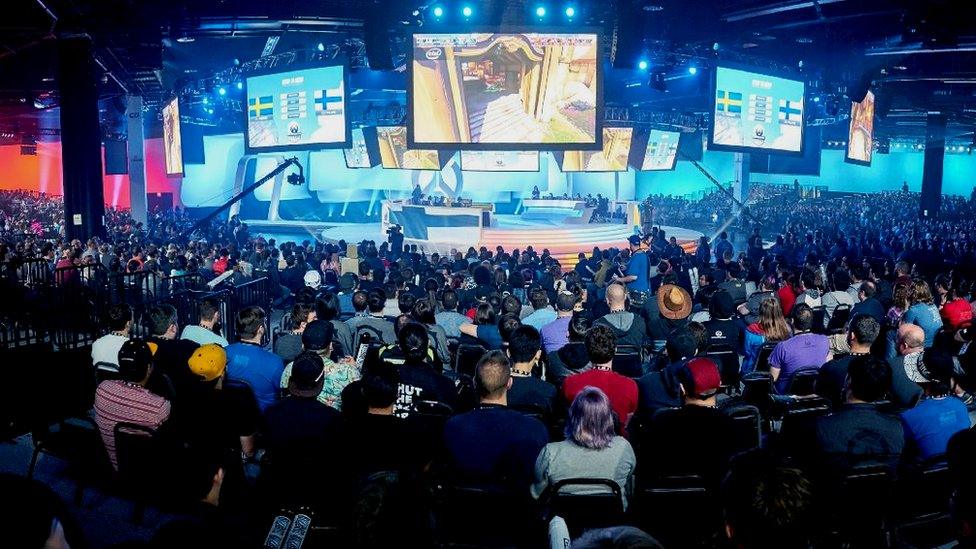Tech Tent: Can e-sports take on football?
- Published

Stream the latest Tech Tent episode on the BBC website
Download, external the latest episode as a podcast
Listen to previous episodes on the BBC website
Listen live every Friday at 15.00 GMT on the BBC World Service

Could video games one day rival professional football as a lucrative spectator sport? Which company is going to win the battle? Who will win the battle of the tech giants to dominate artificial intelligence? And is it time for sharing economy platforms to police their users more carefully? Just some of the questions we try to answer on this week's Tech Tent.
E-sports vie for the big league

Overwatch competitions have already drawn large crowds
Every year it seems that professional sports - and, in particular, football, of both the American and English variety - grow richer, with broadcast rights, merchandise and sponsorship earning billions of dollars for the owners of top clubs, who promptly spend it on players.
For quite a while, we have been told that e-sports, where audiences watch professional video games players in action, will soon rival football and basketball as a lucrative leisure industry. So far, those claims have looked overblown but this week the leading games firm Activision Blizzard outlined its audacious plan for an e-sports league which could match the NFL or the Premier League.
Its weapon in this mission is Overwatch, a cartoonish shooting game, low on gore and designed to appeal to a wide audience. The first seven teams paid $20m each to enter the league and get a share of revenues from future tournaments.
Activision's chief executive Bobby Kotick told us that the Overwatch community numbered 30 million worldwide, from an 18-to-35 demographic that advertisers are desperate to reach. While other e-sports franchises have relied on games and tech firms for sponsorship, he is confident that big consumer brands will want to be involved with Overwatch.
AI battle hots up

For Microsoft, AI is all about augmenting humans
Think about companies pushing back the frontiers of artificial intelligence research, and two tech giants which took on and beat humans at games come to mind. Google, with its DeepMind division which beat the best player of the Chinese game of Go, and IBM Watson, which was victorious at Jeopardy, the American TV game show, have grabbed the limelight.
But Microsoft wants the world to know that it has spent 25 years on artificial intelligence research, and holds records in areas such as computer vision and instant translation, where it outsmarts humans.
At an event in London where the company set out its AI vision, we heard from Microsoft's chief storyteller Steve Clayton. He told Tech Tent that this long record of research was now feeding through into products like Skype instant translation, and the facial recognition system which gives users a speedy login to their PCs.
Emma Williams, whose job it is to oversee the design of its AI products, insists that Microsoft is determined to "make the human the hero", enabling human creativity rather than replacing us with robots.
But Azeem Azhar, whose Exponential View newsletter gives an essential overview of AI developments, tells us that winning at AI is vital for Microsoft's future. He thinks it may be a winner-takes-all game, and those who fail to project themselves as having unique skills will end up with nothing.
AirBnB gets tough on abuse

Dyne Suh spoke emotionally about the incident after her room was cancelled
So-called sharing economy companies have expanded around the world, often focused on rapid growth rather than worrying too much about about how they fit in with local cultures and regulations.
AirBnB, where homeowners play host to travellers, has found itself in trouble in various places over the behaviour of both hosts and guests. But it has now taken action in its home territory to deal with the issue of racial discrimination against those seeking to use the service.
An AirBnB host who made a racist comment to an Asian guest has been fined $5,000 - and told she must attend a course on Asian-American studies. The action was taken due to an agreement between AirBnB and a local regulator, California's Department of Fair Employment and Housing.
Taking that kind of action in liberal California is relatively uncontroversial - now AirBnB must decide whether it can impose the same kind of sanctions in parts of the world with different views on what is acceptable behaviour.
- Published12 July 2017
